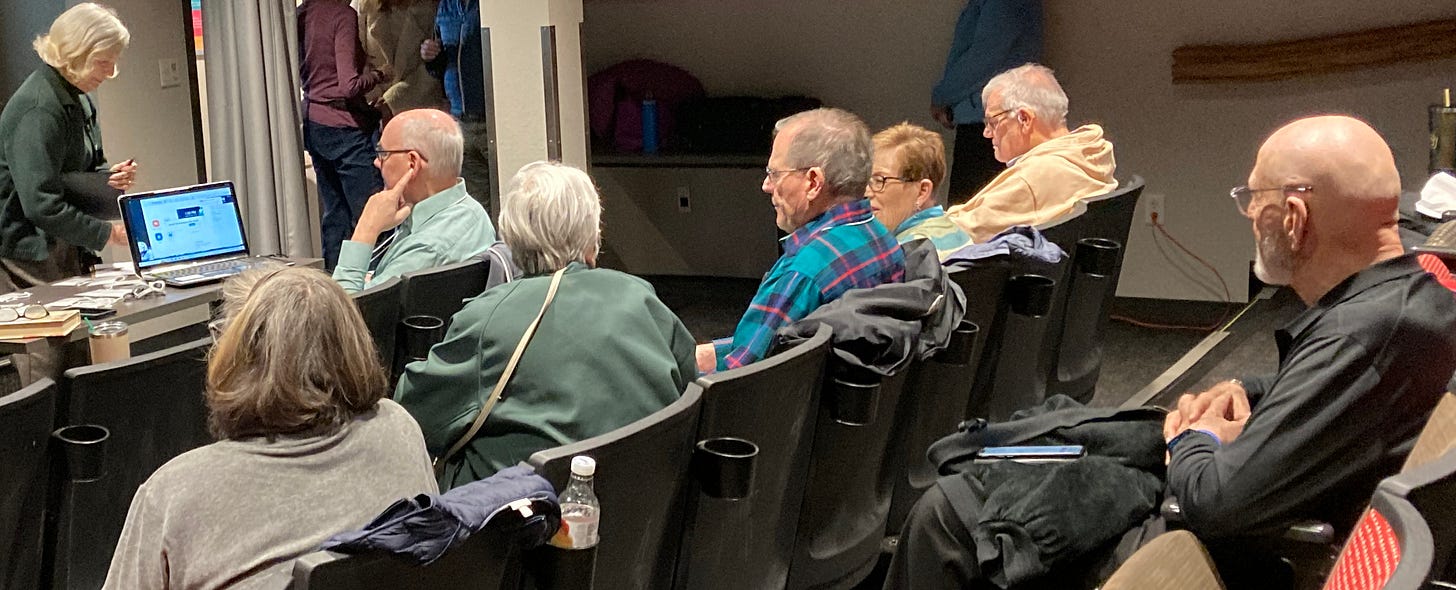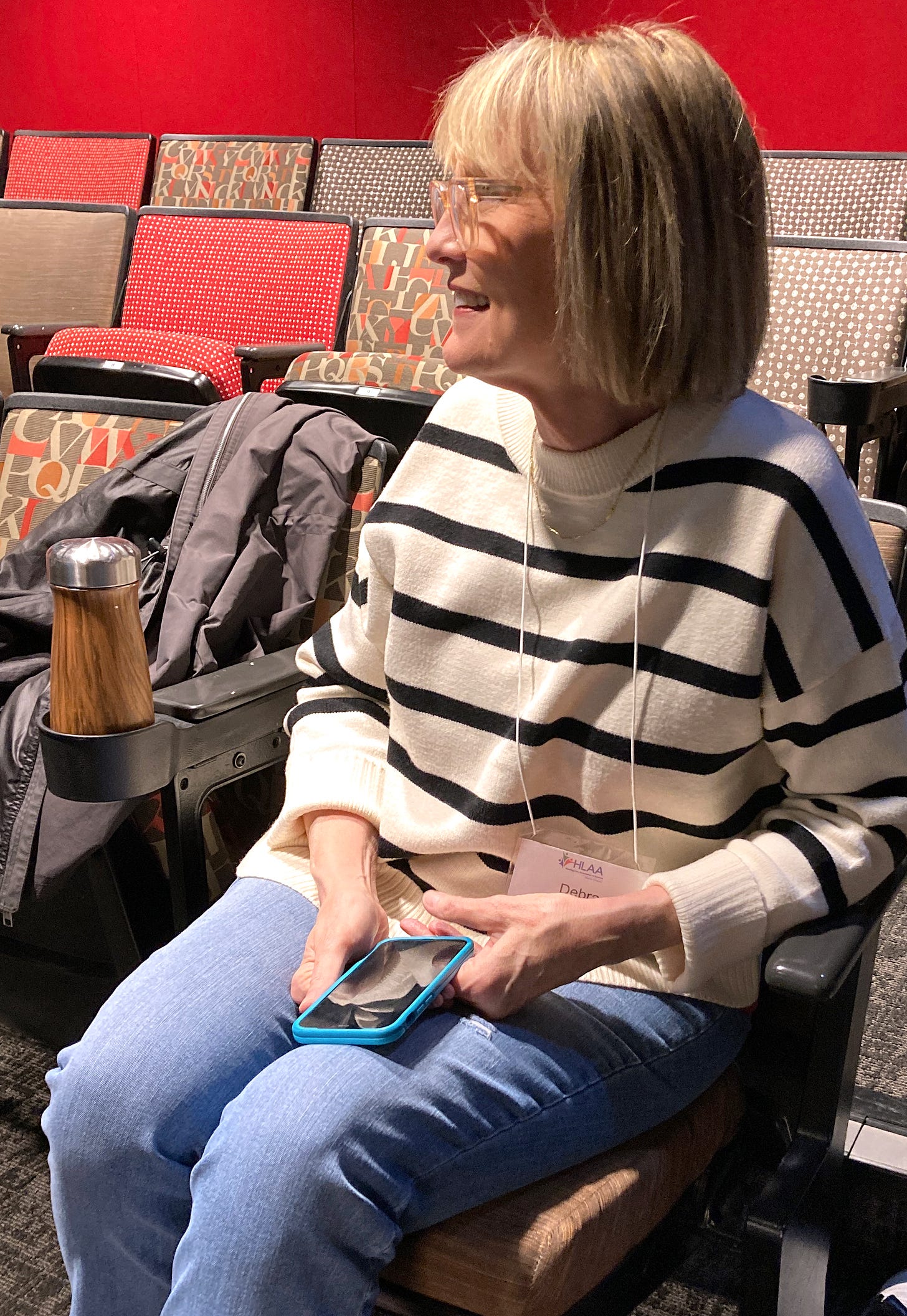New support group to address emotional toll of hearing loss
Denver Chapter co-Vice President Jennifer McBride is putting her experience as a grief counselor to use by starting a support group for people dealing with hearing loss. It will be called Hearing Other People’s Experience (HOPE), modeled after similar groups with the same name. Jennifer says it will probably start this summer, and will be held online. Family members and caregivers will be welcome to participate.
At the March meeting, Jennifer gave a hint of what HOPE sessions will look like with her presentation. She recalled how with her recent hearing loss and cochlear implant, she learned first-hand how emotions like anxiety, frustration, anger and humiliation can accompany such a major life change.
She invited members to share their own memories of adjustment to hearing loss—these included adjustments to relationships and communication strategies. She left us with an overview of tasks for dealing with hearing loss:
Tell your story;
Educate yourself about hearing loss;
Adapt to changing relationships;
Grieve you loss;
Take care of yourself;
Ask for and accept help from others;
Prepare for what’s ahead;
Explore existential and spiritual questions to find meaning.
Looking for comments
With this Substack format, readers can reply to every issue by clicking on the “Comment” button at the bottom of the screen. Some folks like to respond directly by email, which is fine, but by posting a comment, you can be sure all other readers will be able to see it, and offer their own views. Even people who are unable to attend monthly meetings will then have a chance to be part of the discussion. Try it, and I’ll be checking regularly to see how you think we’re doing.
Debra Lamfers watches the presentation
Hearing help goes to work
When he was president of the Denver Chapter, Dave Conant used to begin every meeting with a comment that “This is the best time in history to have hearing loss.” And, year after year, he was always right.
Especially in the current century, hearing assistance devices have constantly become stronger, smaller and more affordable, while the world is becoming more aware of the need to protect hearing and support people dealing with hearing loss. Meanwhile, communications technology and culture have made it cool to text on your phone and have things attached to your ears.
At a recent HLAA-sponsored webinar, professionals in several fields compared notes and advice on how to manage in the workplace by taking advantage of technology. Of the 300 attendees via Zoom, a poll showed most worked in offices, with hospitals the next most common location.
Cochlear with Zoom
David Baldridge is a professor at Oregon State University. He has had hearing loss since preschool—“so way, way back”—and as an adult has received two cochlear implants, the latest with Bluetooth capability. “It’s the best sound I’ve heard since early childhood, and now I don’t need captions,” he says. He often teaches online, and relies on the same technology that hearing people use, such as email and text. He still uses captions when needed. “Use technology as a supplement, so you’re not overly dependent on it,” he advises.
The understanding of coworkers
David DeBellis’s hearing loss story is more complicated. As a child, he lost hearing in his left ear, but didn’t see it as a problem at the time: “I couldn’t understand why everyone thought stereo was so great.” As an adult, he went on to become an engineer, and his workplace alternated between a quiet office and the very loud industrial printing presses he serviced. To visit clients, he traveled and spent a lot of time in busy airports.
When he was in his fifties, his right ear suddenly went silent. He now has a cochlear implant. Before receiving the implant, David says he “relied on the understanding of coworkers.” He notes that the otherwise tragic Covid-19 pandemic provided some relief from the stress of navigating in-person meetings. With Zoom and similar platforms, he notices there are few side conversations and background sounds of busy offices.
‘I act as a bridge’
For Tina Childress, AuD, keeping up with rapidly changing technology is part of her job. She already had her audiology practice when she lost her hearing in 2000. She now has bilateral cochlear implants, and says, “I act as a bridge between professionals and consumers.” Text, email, and phone captions are among the tools everyone can use for communication. She notes that iPhones can provide speech-to-text live captions, and will also caption FaceTime calls. The latter are thanks to improvements in artificial intelligence (AI), which improved during the pandemic. It’s important to speak up to employers and coworkers, she advises: “Tell people what you need; otherwise, they will make the decision for you.”
Auracast: the new horizon
One promising new technology that has come along recently is an application of Bluetooth called “Auracast” that pairs devices automatically with public announcements. For a business traveler like David, that will make airports, with their constant noise and confusing announcements, more hospitable.
Auracast is not yet available. The Bluetooth website is promoting the possibilities while inviting programers (now called developers) to design applications for various sound systems. It explains,
While current assistive listening system (ALS) technologies, such as inductive loops, have been providing great benefit to people with hearing loss, they suffer from a number of challenges that have limited their deployment, including poor quality, high cost, and lack of privacy. Bluetooth worked closely with the hearing aid industry to define and introduce the next generation of assistive listening system technology, Auracast™ broadcast audio.
The company promises both higher quality and lower costs, while taking advantage of the fact that many devices, including many hearing aids, are already Bluetooth compatible. As with loops, there will be one transmitter—as with a radio broadcast—and many receivers. <>
Hearing aids covered in Washington
HLAA chapters are making headway in efforts to guide public policy. The Washington State Association has one success story.
According to the HLAA website, large insurance companies in Washington must now cover hearing aids. Additionally, members of Kaiser Foundation Health Plan can join a class action lawsuit for reimbursement for hearing aids they recently purchased. The law provides for coverage of the cost of hearing aids, assessments, adjustment, fitting and training, up to $3,000 per ear every three years.
Wear a sunflower, get special care
Most airports have wheelchairs and volunteers to help disabled passengers. But some disabilities—such as hearing loss—aren't visible.
Airports around the world are beginning to offer help to people with such "hidden disabilities" by giving them lanyards attached to tags with a very discreet message. It is a picture of a sunflower, and it lets airport staff know that wearers may need special attention.
Gatwick Airport in London was the first to create the Hidden Disabilities Sunflower symbol. It is available at Denver International Airport, and anyone may request the sunflower lanyard, no questions asked. According to the airport's website,
To support passengers with hidden disabilities, DEN has partnered with the Hidden Disabilities Sunflower organization to bring the Sunflower Lanyard Program to the airport. The green lanyard with sunflowers discreetly signals that the wearer, or a member in the group, has an invisible disability and may need additional support.
Travelers, travel care companions, and care partners can obtain a Sunflower Lanyard from a DEN Ambassador or a Customer Service Agent at any of the four customer service information booths at DEN, located in the terminal and in the center of each concourse. Passengers who need assistance may also speak to a customer service agent at any of the information booths, marked with a sunflower decal.
Cochlear training continues
Denver Chapter member Carol Cain is a veteran cochlear implant wearer, and in fact coaches other members who are newly implanted, but she keeps on learning.
She recently took an online class with Cochlear RSM West, to learn about technology related to the Nucleus line of implants. The instructor was Bethany Watson, AuD, the company’s recipient solutions manager.
“I found it very helpful as Bethany explained, demonstrated and I was able to ask questions,” Carol recalls. “The virtual meeting allowed for her to explain with more detail things I didn't understand. I felt the virtual meeting was more informative than general videos.”
The three-part series of sessions cover the Cochlear Nucleus 8, Nucleus Smart app for the phone, and Mini Mic accessory. Carol has invited Denver Chapter members with cochlear implants to check out the class.
The jury’s still out
By Paula DeJohn
One day in early March I received a piece of mail labeled “Jury Summons.” It ordered me to report to the Arapahoe District Court on April 3, 2024. In very fine print on the back, a section offered accommodations under the Americans with Disabilities Act (ADA) and an online form to request them.
Well, I thought, here’s a chance to put to use the information I’ve learned at Denver Chapter meetings and a stint with the Legal Auxiliary Services Advisory Council of the Colorado Commission for the Deaf, Hard of Hearing and DeafBlind. Let’s see how the promised captions and interpreters in the courtroom really work.
So, instead of being reluctant to take time to perform my civic duty, I’m eagerly awaiting this research opportunity. So far…
I looked up the form on the court’s website. It’s www.courts.state.co.us, and covers all the counties and districts in Colorado. It asked, basically, “What is your disability?” and “What do you need?” I replied, “I have hearing loss, and despite hearing aids, I have trouble hearing on the phone and in crowded environments. I would need live captioning.”
I received an immediate email reply: “Request for accommodation is granted.”
Since the trial will not begin until after this issue is published, I will provide an update in the May issue. Meanwhile, here’s a refresher from LAS manager Trish Leakey’s comments in the December 2023 issue:
Communication Access Realtime Translation (CART) captioners are trained as court reporters, but their skills go beyond court reporting. They must be able to generate accurate captions in real time. They include background sounds, provide context, and adjust displays, such as font size and colors, to ensure access to the communication that is occurring right at that moment. Legal Auxiliary Services is responsible for making sure sign language interpreters and captioners are qualified for court and legal settings.
New board member
At its March meeting, the Denver Chapter board voted unanimously to appoint Victoria Rivera as a board member and student liaison. Victoria is an audiology student at the University of Colorado in Boulder.
Next chapter meeting: April 21
The next meeting of the Denver Chapter will be on Sunday, April 21 at the Koelbel Library, 5955 S Holly St., Centennial, CO 80121, from 1 p.m. to 3 p.m. Sarah Matthews, AuD, will speak about her specialty: tinnitus.
Respiro, by Don Scott MacDonald. More at donsart.com.









Enjoyed hearing group members tell their stories of how they cope.
Thanks for excluding list for dealing with hearing loss.
Looking forward to Hope group.
Daisy card for airport travel for our silent disability. Thanks for picture in article.
Thank you, Paula! Lot's of great information and I love the title! I look forward to hearing about your jury duty! Love to hear how CART works out for you in the courtroom.
Marilyn